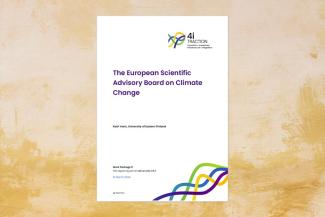
Varis, Katri (2024): The European Scientific Advisory Board on Climate Change. University of Eastern Finland; Joensuu.
The European Scientific Advisory Board on Climate Change
This case study assesses the role of the European Scientific Advisory Board on Climate Change and its procedural governance function of giving expert advice.
Procedural climate governance has a key role to play in reaching climate neutrality by 2050 by providing support for the creation, strengthening, and implementation of EU substantive climate policy. It consists of frameworks, instruments, and institutions shaping the decision-making process and has gone through extensive changes over the past years. The EU framework climate law (European Climate Law) introduced in 2021 the European Scientific Advisory Board on Climate Change (ESAB-CC), an independent institution responsible for providing scientific advice in climate policymaking.
The role of expert advice in climate policymaking is growing across jurisdictions. The main task of such advice is to ensure coherent policy advice that ensures that climate objectives are considered throughout the policy process and across sectors. This report assesses the role of the ESAB-CC in EU climate governance and its effectiveness in delivering scientific advice. The assessment focuses on the mandate of the ESAB-CC.
Previous research has emphasised the importance of creating a clear, formal role for scientific advice in the policymaking process. This report concludes that despite having a mandate enshrined in law, the current role of the ESAB-CC remains somewhat unspecified and gives the ESAB-CC a wide margin of discretion to specify its tasks. This may undermine the effectiveness of the scientific advice and there seems to be a need to clearly indicate the phase and timing of the policy process where the ESAB-CC’s advice should be considered. To improve the legitimacy of policymaking, an obligation for the Commission to consult the ESAB-CC or consider its advice should be introduced.
On the other hand, the flexibility of its mandate allows the ESAB-CC to pick up issues it considers important for achieving the 2050 climate neutrality goal beyond its directly specified duties. Benefits of such flexibility can be seen but some procedural aspects should be further defined to maximise the impact of the scientific advice. While the current mandate guarantees that the structure and work of the ESAB-CC is on the right path, ambiguities in the formal role and procedural aspects may undermine the effectiveness of the scientific advice. Therefore, the report suggests that the upcoming reviews of the Governance Regulation and the European Climate Law further specify and strengthen the ESAB-CC’s mandate to ensure that its scientific advice is profoundly considered in future climate policymaking processes.